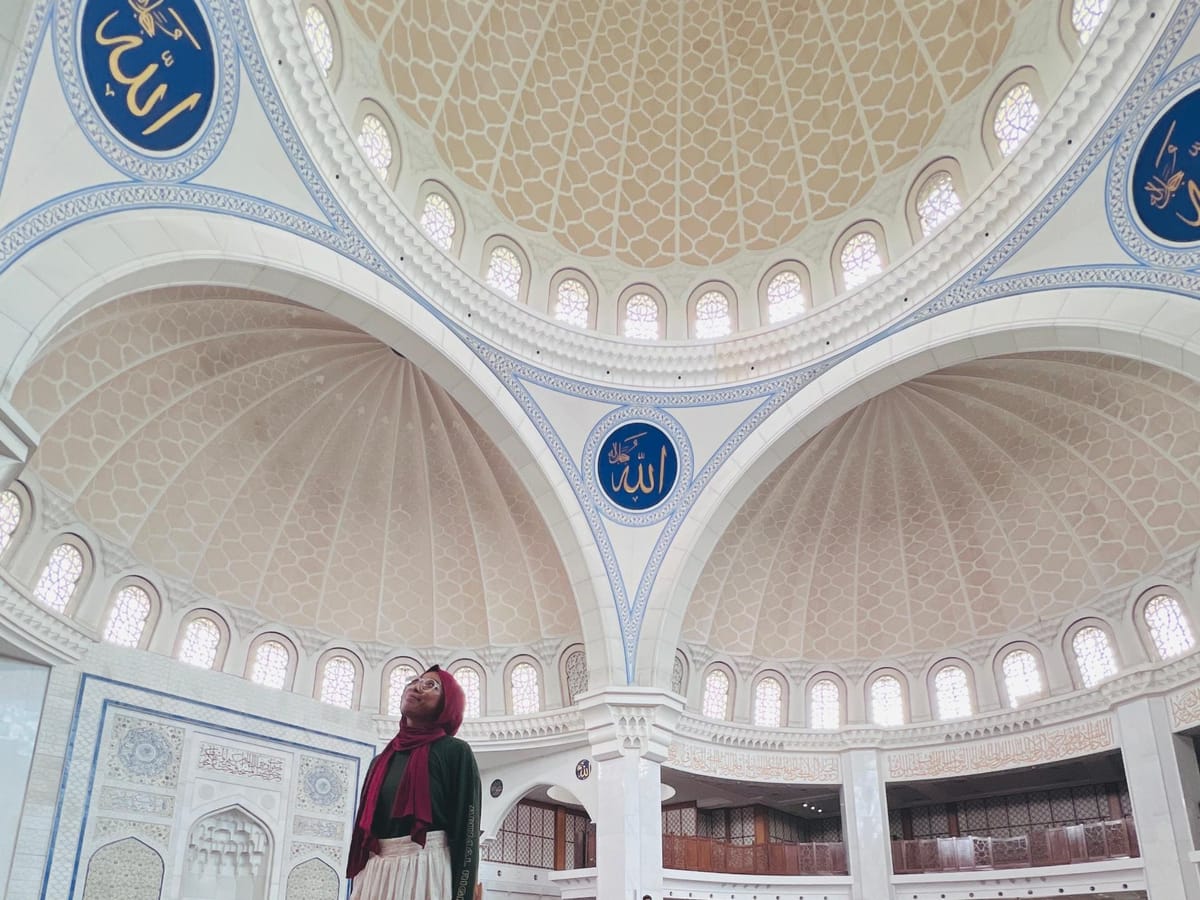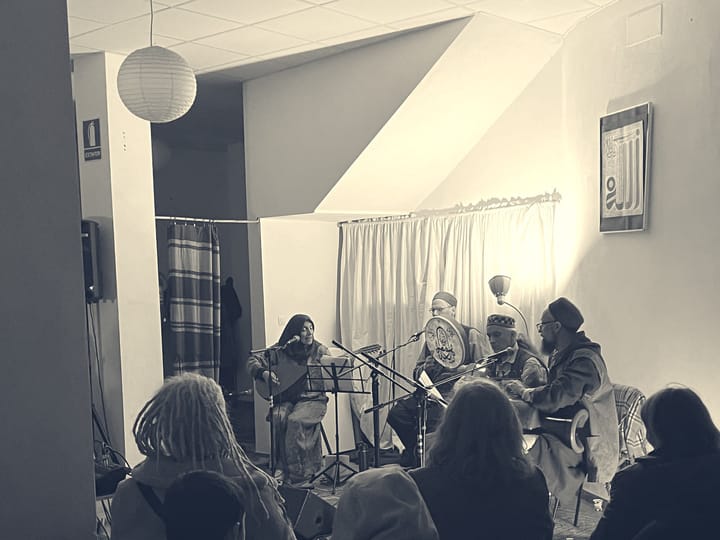Echoes of Compassion: Tafsir Surat Ar-Rahman by Yasir Qadhi | Faith Events Conference Notes

In my mission to understand the Quran better, and by extension get closer to God Almighty, I took the opportunity to learn from Sheikh Yasir Qadhi live in Malaysia in June 2024. Organised by Faith Events, Dr Yasir Qadhi conducted a two-day weekend conference at Masjid Wilayah in Kuala Lumpur. I only attended the second day which was about the tafsir or explanation of Surat al-Rahman, the 55th chapter of the Quran.
First Meeting with Sheikh Yasir Qadhi in Granada
I had the honour of meeting Sheikh Yasir Qadhi in Granada about six months prior, in January 2024. It was a Friday and my friend and I attended the Jummah prayer at the Mezquita de Granada. After that, we decided to walk around the mosque and wait for Asr congregation prayer. Right after Asr, a speaker went to the mic and started telling the history of Muslims in Andalusia in the 8th-15th centuries. My friend recognised the voice almost instantly and went to the front of the ladies line for a better view. Indeed, it was Sheikh Yasir Qadhi.
Later on we found out through a couple of kind sisters that they were on a tour with the Sheikh. They then introduced us, the Malaysian travellers, to the Sheikh. We exchanged a few words and took a picture.

My friend and I lingered for a bit outside the mosque mostly because it was raining and we were deciding where to go next. Lo and behold, Sheikh Yasir Qadhi appeared a few steps away from us. We somehow strike up a conversation with him and he was so friendly. He hinted at us that he will be in Malaysia later that year – exclusive information unbeknownst to the public.
And surely, in June he was.
Sheikh Yasir Qadhi’s Style of Lecture
If you do a YouTube search of Sheikh Yasir Qadhi, you’d notice that most (if not all) of his lecture videos are on average 2 hours long. He really dives deep into each topic and he gives a no nonsense, straight to the point lecture. His style might be similar to Sheikh Hamza Yusuf’s but the latter adds more emotions as per his character. If we look at Dr Omar Suleiman, his is more calm and leans more towards storytelling to get a point across. Sheikh Yahya Ibrahim’s style on the other hand feels light-hearted and warm. And Sheikh Ali Hammuda’s feels grounded yet passionate.
What I’m trying to say is that unlike the other Sheikhs mentioned, Yasir Qadhi’s lecture is often heavy and packed with information which is not for the weak-minded.
On this conference day, I realised that I like learning about Quran tafsir and Fiqh with Sheikh Yasir Qadhi’s lecture style. But for seerah, storytelling, or Islamic lifestyle lectures, I think I prefer listening to Sheikhs Omar Suleiman, Yahya Ibrahim or Ali Hammuda.
Overview of Surat Ar-Rahman
Surat Ar-Rahman, chapter 55 of the Quran, is part of the Mufasal group i.e. the short surahs starting from Surah Qaf to Surah Nas.
This was the first surah that was recited publicly at the Kaabah in a loud voice of Ibn Masrood. This indicates that Surat Ar-Rahman was one of the earliest revelations even before the Hijrah. Essentially, this surah was an answer to arrogance that was rampant in Makkah at that time.
There’s a repetition of the verse “Which of your Lord’s favours will you [humans and jinn] both deny?”. We will explore this further in the next section. But I find this line to be very humbling and when I heard the recitation for the first time, I thought that it was beautiful in a rosy kind of way. It’s hard to explain. I mean, the Quran is beauty in itself but this particular chapter is its own kind of beauty. And indeed, Dr Yasir Qadhi said that Surat Ar-Rahman is known as Arus al-Quran, which is the bride or decoration of the Quran.
And for the most of the 4 hours of the lecture, Dr Yasir Qadhi went through each of the favours or blessings mentioned in the surah, verse by verse.
💡 Prophetic Practice: Recite this Surah during Tahajjud together with Surah al-Najm.
Of Jinns and Humans
فَبِأَىِّ ءَالَآءِ رَبِّكُمَا تُكَذِّبَانِ ١٣
Then which of your Lord’s favours will you ˹humans and jinn˺ both deny? [Quran 55:13]
This verse was repeated 31 times in Surat Ar-Rahman and it emphasizes two main things:
- God has given blessings to all of us in many forms and He questions our gratitude.
- He speaks to both humans and jinn (the unseen creatures that also have free will).
It is known in a couple of narrations that The Prophet (ﷺ) recited this surah to the jinns.
When the people kept silent on hearing the Surah Ar-Rahman, the Holy Prophet said, 'I recited this very Surah before the jinn in the night when they had gathered together to hear the Quran. They responded to it better than you have. As I recited the Divine Words, Fa bi ayyi alaa'i Rabbikuma tukadhdhiban ("O jinn and men, which blessings of your Lord will you deny?") they would respond to it, saying: "O our Lord, we do not deny any of your blessings Praise is for You alone" (Tirmidhi)
Just like humans, there are good and bad jinns. Both of these creatures have free will. I'm not sure if all Jinns can see humans but not all humans can see or sense Jinns. The way I understand this is that both creatures are living in the same timeline but in a parallel universe. Allahu 'alam.
Sheikh Yasir also said that there is a hierarchy of nobility in which humans are superior to jinns and animals. He explained that jinns do not have 'aql or intellect even though they’re faster and louder. Having 'aql plus eloquent speech (verse 4) is why humans are the superior species. As such, Allah appointed humans as vicegerents on Earth.
Why humans are superior to animals
While animals have certain form of intelligence, they do not possess eloquent speech (al-bayyan) akin to humans. The combination of intelligence and eloquent speech is why humans are able to produce material products and advancements that could either improve or destroy lives.
This topic led to Sheikh Yasir going on a tangent about the vegan philosophy. He argued that the vegan philosophy is a direct correlation of disbelief in God.
This irked me a little bit. I don’t think he understood what the vegan philosophy actually is. Granted, the representation of veganism might have been skewed by activists. But in its essence, veganism is simply a lifestyle that does not exploit animals in any way possible. It doesn’t state that animals are equal or otherwise — it is the people who try to persuade others to go vegan that might present such argument.
But he did conclude that a Muslim can choose to go plant-based as long as they don’t adopt the belief that eating (halal and tayyib) meat is completely haram and that animals are equal in every way to humans.
This is basically what I’ve gathered in my studies and indeed, there is nothing wrong with being vegan as a Muslim, so long as you tread carefully in how you advocate for animal justice, which is encouraged in Islam anyway.
What’s important to take away here is that humans being a superior species is contingent upon the fact that humans have the most responsibility to keep peace, justice and balance on Earth.

Of Balance and Justice
The concept of Mizaan or Justice is mentioned in verses 7 to 9 of Surat Ar-Rahman.
Dr Yasir Qadhi mentioned that while there’s direct justice mentioned in the Quran, there’s also room for letting things take its course in the culture. This means that there are certain things that are black and white, but others are in the grey area where humans need to use their intellect and knowledge of the Quran to ensure justice.
We can also observe Allah’s Mizaan (balance) in this world as mentioned in the following verses.
˹He is˺ Lord of the two easts and the two wests. [Quran 55:17]
According to the Islamic scholars, the two easts and two wests indicate either all of the four North South East West, or they are the spectrum of where the Sun rises on different angles throughout the year.
He merges the two bodies of ˹fresh and salt˺ water. [Quran 55:19]
This refers to the halocline where bodies of fresh water meets salt water. It may also refer to the two seas that never mix located in Skagen, Denmark. This is where the Baltic Sea meets the North Sea, with different densities coming from the opposite direction.
Blessings in Higher vs Lower Jannah
The blessings in Heaven for the believers are mentioned in the second half of Surat Ar-Rahman.
The way that Sheikh Yasir Qadhi went through the tafsir was by pairing two ayats together e.g. verses 46 and 62, 48 and 64, and so on. It’s amazing to witness this tafsir unfolding and realise how miraculous the words of the Quran have been meticulously organised.
In verses 46 and 62, we understand that there are 2 higher levels and 2 lower levels of Jannah. The highest level is of course for those who in their hearts truly fear and love Allah. As such, for them is a higher quality of blessings compared to the lower gardens.
Verses 48 and 64 compare the quality of the Gardens. The higher Jannah has abundant lush branches while the lower is described as “dark green”.
Verse 50 mentions free flowing springs or tributaries in the higher gardens while verse 66 indicates that there are only gushing wells (instead of rivers) in the lower gardens.
Verses 54 and 76 speak of the furniture types in each garden. The best quality is of course found in the higher gardens.
Verses 56 and 72 talk about the pleasures that men in particular can have in Jannah. Allah knows that the male species naturally crave sexual pleasure. It is their natural inclination. While there will be male ad female companionship in Jannah, there will also be “maidens with gorgeous eyes, reserved in pavilions” [55:72]. These maidens are for the male who want to satisfy themselves without any compulsion or even jealously from their female companion.
Glory Be to God
تَبَـٰرَكَ ٱسْمُ رَبِّكَ ذِى ٱلْجَلَـٰلِ وَٱلْإِكْرَامِ ٧٨
Blessed is the Name of your Lord, full of Majesty and Honour. [55:78]
The Surah ends with the glory of Allah — as it should.
This is a reminder for us that everything in the Heavens and the Earth belong to the Almighty God and we should be constant in our praise and gratitude for His blessings.
May we all be of the believers who maintain balance and justice on Earth and will experience the blessings in the highest Jannah.





Comments ()